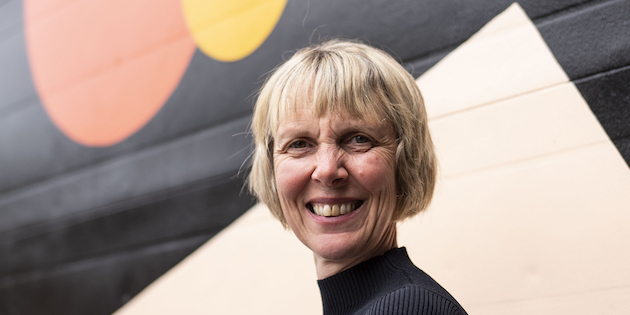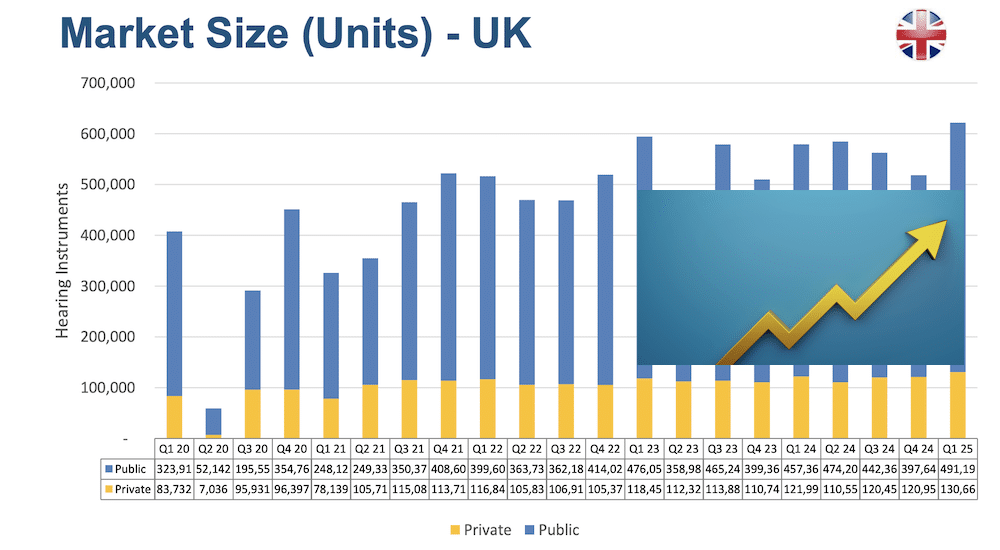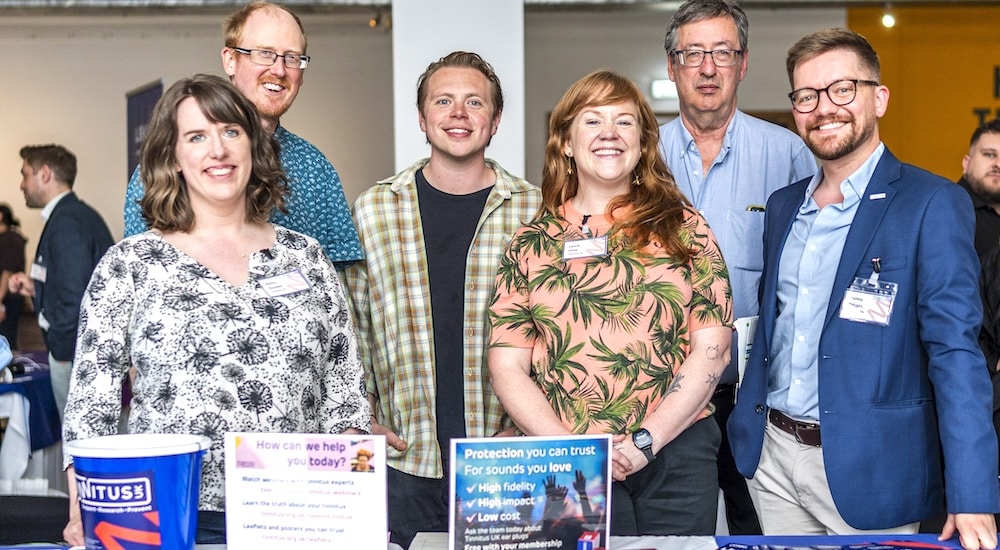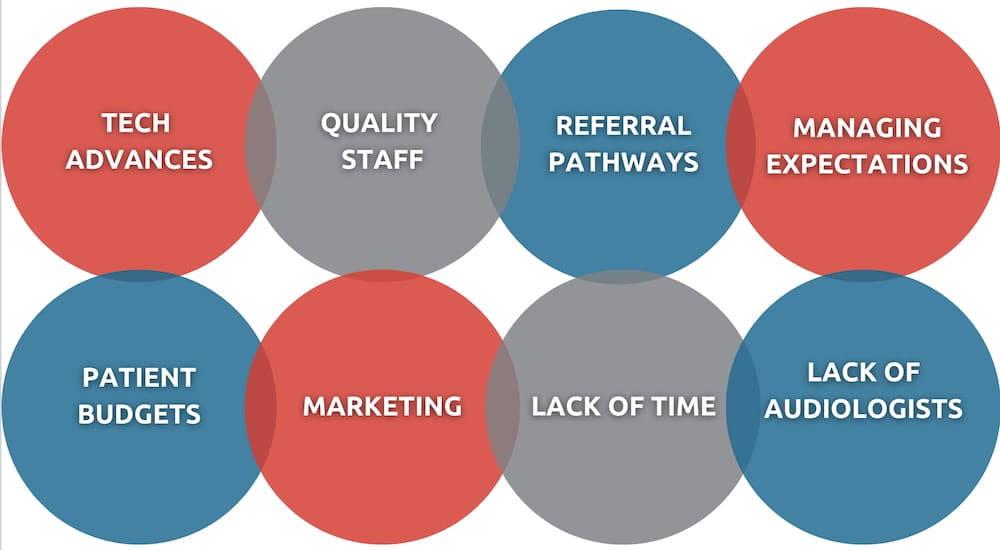INTERVIEW: TINNITUS UK “WE ABSOLUTELY HAVE TO BE HERE!”
Interviewed by Audiology News UK editor-in-chief Peter Wix, New Tinnitus UK CEO Caroline Savage talks with a spirited blend of optimism and realism about the challenges facing her and the charity she now leads.

Dynamism is a special human quality, and any organisation that wants to operate in a big space can do little if their team lacks it.
Lucky, then, those that look on their own doorsteps and find someone with drive, people skills, and clear vision. Tinnitus UK hope they have found such a person in Caroline Savage, their new CEO, appointed from within their ranks.
But in how big a space should this charity be aiming to do its work, funding and guiding research, supporting tinnitus sufferers, creating awareness, and building the conditions for growth?
“A big space!” Savage affirms without the slightest hesitation. “Tinnitus is a condition that affects so many people, and we should be able to be in the space that appropriately represents that number of people. That means we’ve got to be out there,” she stresses.
This ambition is judiciously cut with pragmatism: “I don’t believe we exist in a bubble. The way we’ve worked in the past, we wouldn’t have got in these spaces, but I think now we need to go to that next step in terms of the levels of partnership and people that we work with.”
In this sense, Savage begins her leadership at a good moment for the charity. Solid work over the past twelve years under former Chief Executive David Stockdale has brought partnerships and funding, and crucially, the respect that comes with having good credentials. Tinnitus UK has a super website, an annual conference that has remained online following the pandemic, and a chatbot launched six months ago that is performing well.
What’s in a name change?
Furthermore, before Savage took her post, and after years of deliberating, the charity finally renamed itself from the British Tinnitus Association, a move achieving – laughs Communications Manager Nic Wray – far more than occasionally being confused with another BTA, the British Toilet Association.
“Tinnitus UK – it’s absolutely right there. And in front of you, and people understand, you know, people understand what it is,” Wray underlines. The name change has even attracted plaudits from design and branding experts, and it has an updating value that, says Wray, gets a friendlier tone across to people.
“I think the other thing is that it’s a brand that’s confident that perhaps means we can own this space, that we can stand as prominently as perhaps some of the big charities – British Heart Foundation, Cancer Research – because we know who we are as well,” adds Wray.
© NW Nic Wray, Tinnitus UK Communications Manager: “The more we speak, the more people come to us, and we still need to build that.”
Although she drops big names for charity comparisons, there is no intention from either Savage or Wray to suggest that Tinnitus UK, which has no funding from any statutory source and must find all its own finance, can do its work in such vast spaces as those household names with thriving charity shop networks. But how big can it aim?
Estimating the societal relevance of medical conditions, even those that drive individuals to desperation, is an exercise that becomes tedious and confusing after a few tries, and distorted to the banal once the awareness-boost factor of suffering celebrities – Bob Dylan and William Shatner (Captain Kirk) among the tinnitus clan – is introduced.
But interesting evaluations come from a socioeconomic direction, and there is one for tinnitus: a 2017 economic evaluation of the healthcare cost of tinnitus management in the UK that equates to an NHS healthcare bill of £750 million per year, a study Tinnitus UK (BTA) was involved in. Update that figure to take in huge cost increases by 2023 and, agrees Caroline Savage, the bill might be approaching one billion smackers.
Judge for yourselves how much it means that another recent analysis of the direct healthcare costs of treating migraine was around £1 billion per annum.1 There is also research (British Pharmaceutical Industry in collaboration with an independent Dermatology Expert Working Group (EWG)) suggesting that more than three million primary care hours are spent on skin conditions, at a cost to the NHS of £723 million each year.
If anything, such correlations might just underline the comparatively great need for tinnitus support and research. For Caroline Savage, there is no doubt about how important the charity is in this picture.
“I was doing some shadowing on the helpline recently,” she recounts. “Those callers, their situations, and the reasons they’re coming to us are changing and becoming more complex. And in some cases, tinnitus is one part of a bigger issue that people are having to deal with, whether it’s complications with mental health issues as well, whether it’s complications with cost of living and concern about their ability to meet bills, massive rises in stress, anxiety, concern about their day-to-day life […] and on our helpline, through our support services, we’re talking to people now about a lot of other coexisting conditions and situations,” explains the new CEO, before emphatically declaring: “So we absolutely have to be here! We absolutely have to be here!”
“And when you talk to somebody, Peter, and they tell you that the reason they’re talking to you is, yes, they have tinnitus, that it is concerning them, but also the reason they’re talking to you is because they can talk to you, because when they rang the GP surgery, they were number 37 in the queue…” Savage makes her point.
So, whatever the space Tinnitus UK occupies as an organisation, their team is firmly committed in its response to a growing need for help. Nic Wray recalls celebrating, during her first months with the charity, having 400 people follow on social media. “You know, now we have tens of thousands on our mailing list. We have nearly one and a half million people come to us on the website.”
Meanwhile, the chatbot – Axel – is also notching up big numbers and plenty of interest, as well as a Best Poster prize at the British Society of Audiology’s Scientific Meeting in June 2023 for The experience of Tinnitus UK and their development of Axel, a chatbot for tinnitus support.
Axel is finding about 300 users per week, Savage explains, and will undergo a full review this July of its first six months of operation. “There are definite spikes in use around Friday evenings, for example, Saturday afternoons, all those times when we know we wouldn’t have been able to support anybody normally, which is amazing,” points out the CEO.
Tinnitus is not in the same sphere as hearing loss
Whatever the space in which Tinnitus UK will grow, both Savage and Wray stress that it must be one separated from its now standard association with hearing loss.
“We are not in the sphere of hearing loss. We are subsumed into that space, and we shouldn’t be because that’s not the case,” argues Savage.
Even in high-level debates around hearing loss, such as on DHSC round tables, the charity insists on being an equal but separate part in such representations. Despite the common comorbidity of tinnitus with hearing loss, “tinnitus is separate from hearing loss,” Savage insists, “and sometimes the needs of people with tinnitus are very different to the needs of people with hearing loss.”
Caroline Savage, CEO
When David Stockdale stood down after 12 successful years as the Chief Executive of the then BTA, Caroline Savage came in as interim head of the charity, having been with the charity for just over a year, quickly taking on senior duties in fundraising and communication.
A new CEO, Deanne Thomas, was announced in October 2022, but in late January came the surprise announcement that Thomas and the renamed Tinnitus UK had parted company over differences in “alignment” approaches, “things that can happen” says Savage, whose subsequent appointment to the top office came in March 2023, and she embraced the full CEO role, now leading the charity’s service development, relationships with the trustees, “everything that fits in within the whole gamut of the organisation”.
Underlining what a “great” and innovative team the charity has, Savage admits that saying goodbye to Stockdale – “a magnificent ambassador and advocate” – has meant “quite a change for the organisation”. Does she think the hiatus in replacing such a figure has lost the charity some ground?
“For the organisation, obviously, for a lot of people, they hadn’t known anybody else but David as the CEO,” Savage admits, and points out that Stockdale brought in Tinnitus UK’s ubiquitous Communications manager, Nic Wray, thirteen years ago. Wray is a strong and knowledgable consigliere to help the new CEO.
“We went through quite a change at that particular time as well in terms of restructuring and rebuilding our fundraising team, looking at where we focused in terms of our communications, but making sure also that we still had a real focus on our service delivery, because ultimately we are still here for people living with tinnitus, and we are still here to try and progress that route to find a cure, to find new management techniques, to help people to live well with the condition,” Savage continues.
The charity’s appeal this spring has centred on giving people hope that there a cure for tinnitus can be found, helping people know they can live well, says Savage. “I’m absolutely about driving forward that message and that support. We brought the team with us, you know, the team has understood we’ve had to go through some changes to prepare ourselves for the future. And let’s be fair, we’re not the only organisation that’s having to deal with an awful lot of challenges at the moment.”
Fundraising for tinnitus – there are no quick fixes
Thus committed to supporting people with tinnitus, the charity must find the readies to support itself, and to increase investment in research activity. “We are here to progress that route to research, so the big thing for me is that we look at how we raise more funds to do that. So one of the things I’ve been tasked with now by the trustees, as the new CEO, is to go away and review our current strategic plan, update it as necessary, and look at how to grow our funds,” says Savage.
Climbing that hill is tough for most charities, large or small, the new leader points out, acknowledging that Tinnitus UK operates in a smaller space to groups such as the Royal National Institute for Deaf People (RNID). Nevertheless, all charities have been hit by the pandemic, which dramatically slowed down grants of probate and distribution of estates.
Many charities depend on legacies for as much as seventy percent of their income. “That’s huge,” Savage exclaims. “For all those people, it’s a challenge to balance those books for that money to come through, but it’s also a challenge to try and diversify some of that income generation, to be able to look at other opportunities, to be able to grow and supplement your income in other ways.”
Tinnitus UK’s recent consultations with the RNID revealed common ground between the groups on a widening of scope of income routes. “For ourselves, we need to look at making sure that all the avenues that we’re looking for to raise funds are operating and working as well as they possibly can. And all those things take time, you know, there’s no quick fix to these situations.”
And the need for funding means maintaining current relationships and establishing new ones, a challenge for a new CEO. Does she now have to run around, introducing herself, repeating the charity’s values and goals? “You absolutely do! Thankfully, you know, David [Stockdale] left a strong heritage for me, and he’s been very kind in allowing me to use his name sometimes, which obviously makes a difference. But also Nic [Wray] has a very strong reputation in the field so, again, Nic has also been very supportive and helpful in paving the way for me to introduce myself and make some relationships, giving me context to situations for me to be able to step in and have a conversation.”
Major research goal: a Tinnitus Biobank
With its identity and values clear, Savage and her team can focus on the research tasks ahead, perhaps the most important long-term project being the creation of a Tinnitus Biobank. Savage explained that the idea has been discussed for long enough for action to replace words: “We can’t just keep having conversations, so the [Tinnitus UK] trustees made a decision to invest in a feasibility study, as to whether we could potentially put together a Tinnitus Biobank in the way that we had envisaged, and we have now partnered with the University of Manchester to deliver a feasibility study on our behalf.”
That stage-2 testing programme, now at the halfway point, has been fully lab-based at the University of Manchester, which has been recruiting through its volunteer database for people to come in and undertake a series of tests, as well as online questionnaires and practical audiological testing. Once the researchers, led by Gabrielle Saunders, know how to put together the right bank of tests, the project will make use of Manchester’s famous Academic Health Science Centre Ladies in the Van vehicle, and spend summer touring Greater Manchester, adding to data.
So, Tinnitus UK, has both literally and metaphorically got the wheels back on. It may not be a fleet of Range Rovers, and the van comes by way of friendly academics, but for now at least, small might be beautiful. “Because we’re a small organisation, we can be relatively agile,” Savage contends. “We can be agile, and we can offer people the opportunities to find ideas, talk to us about finding funding, and be able to develop something within that remit of supporting people with tinnitus.”
1The Work Foundation. Society’s headache The socioeconomic impact of migraine. The Work Foundation, 2018.
Source: Audiology News UK issue 03 July-August 2023



